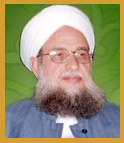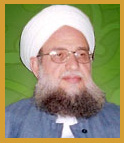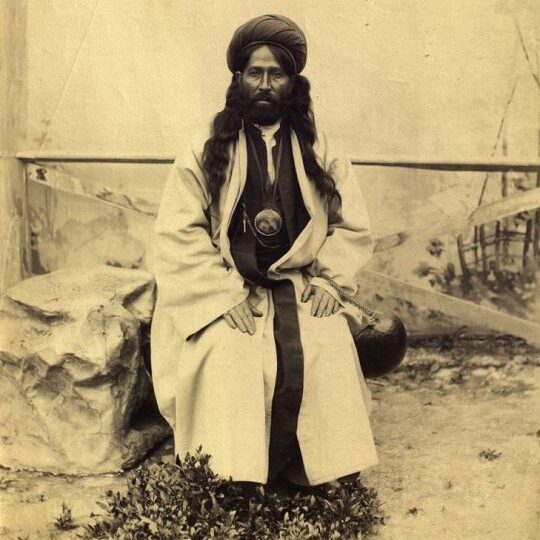 Question:
Question:
Is it permitted for a Muslim person to say: “al-madad ya rasulullah” or “ya Abdal-Qadir” or what is similar to that?
Answer:
This issue is a branch of the issue of istighatha, seeking aid, from created beings. And I have written on this in my letter entitled “Seeking the means, at-tawassul, in the Sunnah of the Prophet (s) and His Sahaba” because the Shari` evidences prove that al-istighatha is a branch from the (overall) issue off seeking the means, or intermediation (at-tawassul), as is shown by examining these evidences, insha-Allah.
It is not possible to treat this issue except after we understand the meaning of the utterance al-istighatha, and its use according to the Shari`ah. Linguistically, expression of al-istighatha in the sense of seeking aid and is built on that premise, that the istighatha of the created being is in what it has capability to do and its permissibility is agreed upon as in the Holy Quran in some of what is related about Prophet Moses (pbuh), where:
فَاسْتَغَاثَهُ الَّذِي مِنْ شِيعَتِهِ عَلَى الَّذِي مِنْ عَدُوِّهِ فَوَكَزَهُ مُوسَىٰ فَقَضَىٰ عَلَيْهِ (15القصص
“and he who was of his caste asked him for help against him who was of his enemies. So Moses struck him with his fist and killed him.”(28:15)
And from this includes whatever is within the capability of the created being for which their aid may be sought or their intercession. And it is related in a hadith regarding the shafa`, intercession on the Day of Judgment, as related by Bukhari with the wording “astaghaathoo bi-Adam” they sought Adam’s assistance” (al-Bukhari, Chapter “On whom people seek in large numbers” 5/324), in other words they seek intercession (ash-shafa`ah). And this particular expression is repeated in what is mentioned about a group of prophets, upon them be peace. And istighatha, here, is with the meaning of seeking aid, support or help. And the image we have of assistance is for the prophets to seek from Allah at the last station of the Gathering and beginning of the final accounting. And that is the meaning of shafa`ah, intercession, and that is the meaning of calling upon other than themselves in that they seek from the Creator, which is the reality behind their invocation.
And the expression and the action of istighatha is ja’iz, permitted, and it is not possible for a knowledgable person to say it is forbidden, and to prefer to say “it is association (shirk) with Allah the Exalted,” after what has been authenticated in Sahih al-Bukhari.
And al-istighatha, in the meaning of seeking intercession and invoking, is clearly acceptable without any doubt, but the difficulty comes in other than that, for example, is it possible for a Sahabi to say to the Prophet (s) “forgive me” or “enter me into Paradise,” or “save me from the Fire” or in this vein, in the affairs that no one has power over except Allah the Exalted with the meaning of “ask Allah for me to do that” i.e. intending by these words seeking the supplication in resolving a difficulty; is that type of thing permitted???
The answer is that in reality just such kind of a request was made to the Prophet (s) and this is established by an authentic narration. And it is necessary to give the interpretation to this request with a correct understanding which conforms to the desire of the Divine Law, as it is narrated in a Prophetic sunnah. And in fact the Muslims knows what is permitted and what is not permitted. And in this narration, the companion Rabi`a bin Ka`b al-Aslami says to the Prophet (s) “asa’luk murafaqatik fi’l-jannah, I ask you for your company in Paradise,” as related in Sahih Muslim, chapter “The benefit of prostration and its encouragement” 3/40), 757, and his (seeking) entrance into Paradise (is) by the Hand of Allah the Exalted, (for) no one has power to do this except He, may He be Exalted.
And inasmuch as this statement is confirmed and it is in the sunnah, it makes it definitely permitted and not forbidden nor association (shirk) with Allah, for the Prophet (s) would never agree or accept from anyone words which are forbidden and if it was shirk, association, it is even more rejected (OR: he would have rejected it even more firmly). And if it is permitted by the acceptance by the Prophet (s) no one may be able to reject it, not even by saying “it is not the preferred way” because if there was in it any non-conformance with the Divine Law however slight, the Prophet (s) would have told the one saying it: “leave this expression, even if the intention is correct, because its expression is mistaken and improper.”
And for this hadith it is enough that its expression indicates two possible correct meanings and a third meaning is possible but not acceptable, even if the expression is allowed, because it does not agree with the law. The first meaning is the closest to the intent, and it means in effect these words, “I ask you to supplicate Allah for me to make me your companion in Paradise” in other words he is seeking the means (tawassul) by requesting the prayer of the Prophet (s) and this type of seeking the means is agreed upon as acceptable in law. As for the second possible meaning of the expression (“I ask you for your company in Paradise,”) and this one is closer to the apparent meaning of the wording, is for the Prophet (s) to enter him into Paradise by his comradeship to him, but with the permission of Allah the Exalted.
And (consider here) was it not permitted to Jesus (as) to revive the dead by the permission of Allah? And did he not created from clay the figure of a bird and blow in it and it became a bird, by Allah’s Leave, and that will not be shirk, association, nor forbidden, for it is easier to accept for the Prophet to enter a single member of his nation into Paradise by Allah’s leave, as it was narrated in many hadiths of the intercession on Judgment Day.
And as in Allah’s saying to him (s), “bring those of your nation who have no reckoning into Paradise from the far right gate” (Bukhari, tafseer of dhurriyata man hamalna ma` noohin innahu kaana `abdan shakoora (17:3) and this entering into Paradise is also because of the Prophet’s seeking it, and that is from Allah to that particular companion or it could be that is by Allah’s Leave from before without any request by the Prophet (s).
As for the third possible meaning of the expression, “I ask you for your company in Paradise,” and it is unacceptable, rejected and invalid, and it would not come to the mind of a Muslim to intend this, and it is, “for the Prophet to do this without Allah’s Leave” for every Muslim knows the importance to the Prophet (s) and to the other prophets, that they do not intercede with Allah except by His leave, and that they do not do anything in his Dominion except by the Permission of Him, may He be Exalted and Glorified.
And anyone who accuses a single person from among the Muslims that he would intend this meaning by such an expression, say to him, “did you split open his heart?” as the Prophet (s) said to Usama ibn Zayd (r) when he claimed that a man from the unbelievers said, “laa ilaaha ill ‘Llah” intending by it only to escape from being killed. And if this possibility is false, and it is something that would never come to the mind of Muslims, then one must, if this has been said to someone, you intended by this the meaning which results in unbelief and therefore due to this you are an unbeliever.
Nay, it is not allowed for anyone to claim that it is preferred to avoid such expressions because they are mistaken and have unacceptable meanings. For the Prophet (s) was more careful than us on upholding correct belief in Allah’s Unity and he never said to who spoke thus “don’t speak like this, leave it.” And as came in the expression and was accepted by the Prophet (s) similarly it was confirmed from Sayyidina `Amru ibn al-`As (r) his saying to the Prophet (s) “ashtarta an taghfir lee maa maa awda`t min sad `an sabeelillah” – “I stipulate a condition that you forgive me what I have done in hindering men from the path of Allah” (Musnad Ahmad 17109-178-36, Muslim, Chapter “Becoming Muslim destroys what preceded it as does hijrah and hajj”) with the wording “an taghfir lee” – “to forgive me” with the characteristic that it is built on the unknown and the narration of Muslim is not stronger than that of Imam Ahmad’s rather it is the opposite, it is confirmed as authentic.
And indeed the scholars said, “the meaning of the two (narrations) is one and the same. And they didn’t say we give more weight to Muslim’s narration and leave completely Ahmad’s. And there is no doubt that the forgiveness of sins is something specific/specialized to Allah the Exalted, and the Prophet does not have the power to do that, except in seeking it from Allah or by Allah the Exalted’s leave, without the request of the Prophet (s). Nevertheless the word came with this apparent meaning, and it is a manner/style well-known linguistically and in the law.
And the Prophet (s) explained this style in the hadith of the People of the Ditch in sahih Muslim. The Prophet said, about the youth who took safety at the hands of the priest and Allah made him of those whose supplication is accepted: فأصبح الغلام يشفي من العمى والبرص وسائر الأدواء “fa-asbah al-ghulaam yashfee min al-`ama wa’l-baras wasai’r al-adwaa” and the youth became one who could cure blindness, leprosy and all other kinds of maladies” (Sahih Muslim, Chapter “The story of the Companions of the Ditch and the magician and the monk and the youth”, 292-14). And he related the curing of illness (directly) to the youth. And it was related that a companion of the king who had gone blind said: “If you cure me all these things collected here would be yours.” The youth said, “I myself do not cure anyone. It is Allah Who cures and if you affirm faith in Allah, I shall also supplicate Him and He will cure you.”
So he clarified to him that the real Healer is Allah the Exalted and he made it clear attribution of healing to the youth in the earlier words of the Prophet (s) in fact were with the meaning that it is a cause for healing by the mediation of invoking Allah the Exalted, and when someone puts together this hadith with the hadith (“I ask you for your company in Paradise,”) and the hadith of `Amru ibn al-`As, “I stipulate a condition that you forgive me what I have done in hindering men from the path of Allah” it will become evident to him that seeking something that no one has the power to do but Allah the Exalted through the supplication of the Prophet (s), and it is permitted, as shown by these hadiths, even if a Companion had come to the Prophet and said, “al-madad ya Rasoolullah!”, meaning by it seeking his aid by means of his supplication that would in fact be the correct manner in the language and under the law, as we understand from these ahadith. Because that is what the Prophet does have in his capacity (ie. to supplicate).
And this style, i.e. attribution the deeds of the Creator to a created being as a cause, is confirmed in the Quran even in one word as in the saying of Jibreel (as), “innamaa anaa rasoolu rabbiki li-ahaba laki ghulaaman zakiyya” – “He said: ‘I am only a messenger of thy Lord, that I may bestow on thee a faultless son.‘” (19:19), and in one of the readings from the seven (accepted) readings “that he may bestow” (li yahaba) and indeed I explain this in my article “at-tawassul” (the intermediation). And if someone says, “this is permitted during the Prophet’s life but after his death (s) is it permitted?”? The answer to this is in two parts: First: it is to respond by saying “in the issue of association with Allah, there is no difference between the living and the dead, for as it is not permitted for anyone to say to the Prophet after his death “you are my Lord,” so it is not permitted to say to him during his life.
Second: as long as this statement “I ask you for your company in Paradise,” and “I stipulate a condition that you forgive me” and “al-madad yaa rasoolullah“, as long as the meaning is requesting the supplication then this is not association (shirk), because he is addressing the created being by it as if he had said to him “pray for this for me” and it is incorrect to say to Allah the Exalted, “pray for me”.
And if we depended on the saying that the dead do not hear, then there will be no association (shirk) in this because you are addressing the Prophet(s) with a request for his supplication and that is from the traits of created beings and not from the traits of He most Exalted. And therefore if we depend on the view of those who say “that the dead do not hear” we say to him, “your statement does not benefit (have effect), because they don’t hear you or claim that the dead are not called out to and this claim conflicts with the explicit evidence to the contrary. Then if you build this on the statement that ‘the dead do not hear’, while most of the Imams (agreed) that they do hear, even ibn Qayyim said, “there are mass narrations from the early generations on that” and the author of the Quranic commentary “adwaa al-bayaan sharhan mufasillan” explained this issue and I mentioned the evidence in my article “Intermediation according to the sunnah of the Prophet and his companions” with the permissibility as we mentioned that article that the dead hear and supplicate for themselves and for others.
In any case, it is not from the right of anyone, if the most weighty word in his view to constantly accuse people if they do not feel satisfied/content with his evidences, to call them innovators or polytheists (mushrikoon). And if he insists on that say to him: “Therefore you accuse of wrongdoing and deviance whoever says that from among the Companions and Successors and those after them up to the people of today.”
And issues of ijtihad are such that if a person who acted on it were considered to commit wrongdoing, then all the scholars would have been considered as doing wrong. And what does he say about himself when it is evident that he has made a mistake in his prior ijtihad, for if he says “I don’t accuse those of innovation because they said that based on their ijtihad and as for those saying this today, they are saying it from ignorance and vehement party spirit.” Then the answer to such words is to say to him “whoever lacks the ability to make ijtihad is obliged to imitate the scholars who have been granted license to do it. Whoever is from those able to perform ijtihad, will say it with conviction.”
But as for your claims that they are saying this out of party spirit then it is said to you did not the Prophet (s) say, “did you open his heart?”



